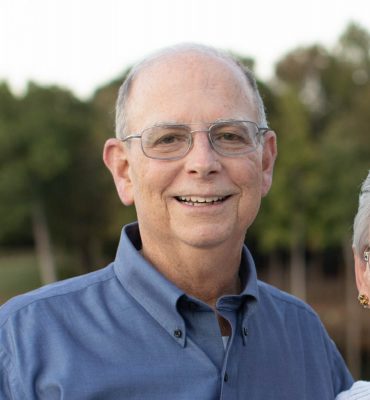Sleep Apnea & Snoring
Why Sleep Dentistry?
 This will begin with the story of my Dad, Charles R. Payet, to explain why treating snoring and sleep apnea is both important & deeply personal to me.
This will begin with the story of my Dad, Charles R. Payet, to explain why treating snoring and sleep apnea is both important & deeply personal to me.
On August 1st, 2020, my Dad passed away due to congestive heart failure. He was only 75 years old. He was diagnosed with A-fib, congestive heart failure, & sleep apnea when he was 62.
As I grew up, Dad’s snoring was legendary. My sister & I hated sharing a hotel room with Mom & Dad on vacation; after my sister & I left for college, we learned that they often slept in separate bedrooms, so Mom could sleep. Back then, we all thought, “It’s just snoring.” How I wish now, that we’d known more in the ’80s and ’90s. If he’d been diagnosed earlier, he’d likely still be alive & healthy today. But we didn’t know of the strain that sleep apnea puts on the heart and lungs, as they struggle to get enough oxygen into the bloodstream. We didn’t know the effects of decreased blood oxygen saturation, night after night, week after week, year after year. Because of that, my Dad is gone far too soon, and I miss him more than words can express. I’d do almost anything to help patients avoid going through that, or having to watch a loved one do so.
What is Sleep Dentistry?
While it might seem odd to talk with your dentist about snoring or sleep apnea, it really makes perfect sense. Dentists see patients more regularly than physicians do, and we look in your mouth, where we can see many signs of associated problems. These include acid erosion of teeth due to acid reflux/heartburn, restricted airways, gag reflexes, crowded teeth, enlarged tongues, and more. So while we can’t officially diagnose anyone with sleep apnea, we’re in the perfect position to identify the problem.
As your dentist, Dr. Payet can play a pivotal role in coordinating the physician’s diagnosis with the appropriate treatment. One of the benefits of using a provider trained in sleep dentistry such as Dr. Payet, is that he has many more treatment options for patients vs. standard CPAP mask (see below). that we often associate with snoring and sleep apnea.
If you have seen a sleep medicine physician and are in need of an appliance, Dr. Payet can recommend options based upon your specific diagnosis (primary snoring, mild-moderate sleep apnea or severe sleep apnea). These treatments range from Night Lase Laser therapy or professional SnoreGuards, to oral sleep appliances, to CPAP, and to a combination of approaches.
Snoring vs. Sleep Apnea
Here’s a really important thing to keep in mind: not all people who snore have sleep apnea, and not all people with sleep apnea snore. Just because you have one, doesn’t mean you have both, but you might!
Snoring is that harsh sound made, when the soft palate and uvula (the little thing hanging down at the back of your throat) vibrate from air flowing over them. All by itself, snoring isn’t dangerous, unless it keeps your bed partner from sleeping, and they hit you to make you stop. NightLase Laser Therapy helps reduce snoring, by improving the tone and volume of collagen in the soft palate and uvula. This makes the tissue firmer and less movable, so there’s less vibration.
Patients with sleep apnea, on the other hand, actually stop breathing for short periods during the night. This is caused by your airway being blocked, usually by relaxation of the throat muscles and the tongue falling backwards. Enlarged tonsils, adenoids, nasal congestion, deviated nasal septums, and excess weight also contribute to blockages. These blockages can last for mere seconds, or they can last for over a minute at a time. The more frequently this happens, the greater the risk to your health, because blocked breathing lowers blood oxygen levels. Simply put – that’s bad, because it increases your risk of cardiovascular and metabolic diseases.
Sleep Apnea is a Serious Medical Condition
Data from a several studies indicates that untreated sleep apnea will decrease life expectancy by about eight years. If Dad had been diagnosed 20-30 years earlier, who knows how much longer he might have lived? How many hospital visits & surgeries he could have avoided? If I can help others avoid watching their loved ones go through what my Dad did in his last few months, that will be more valuable than any root canal, crown or filling, or veneer I’ve ever done. Don’t get me wrong – I love helping people smile with confidence, eat the foods they love, and maintain healthy mouths. None of those have quite the same impact that sleep dentistry does, because sleep dentistry can change your entire life.
Most simply described, sleep apnea deprives your body and brain of oxygen. Decreased blood oxygen levels force your heart and lungs to work much harder than they should. This can happen at any age, so the earlier it’s diagnosed and treated, the greater the long-term improvement of your health.
Indications You Might Have Apnea
If you have or experience any of the following, you should be evaluated for sleep apnea. If you have multiple medical conditions listed below, you’re very likely to have it. The good news is, by treating sleep apnea & breathing better, you might reduce or not need as many medications.
- Wake yourself up with gasps/snoring
- Grinding or clenching your teeth at night and/or during the day
- Are tired during the day, even after 7-8 hours of sleep
- Rarely get even 7 hours of sleep
- Frequently wake up during the night for any reason
- “Brain fog,” or that feeling of grogginess and difficulty focusing
- Unable to function well in the morning until after some caffeinated drink
- ADHD or similar symptoms
- Diabetes (poor sleep causes cortisol release, which makes it hard to regulate glucose)
- High blood pressure
- Heart disease, such as congestive heart failure or atrial fibrillation
- Struggle to lose weight
Screening, Diagnosis, and Treatment of Sleep Apnea
Dr. Payet and his team will evaluate you for both signs and symptoms of snoring and sleep apnea. If we identify risk factors, we will connect you with a Board-certified sleep physician for a telemedicine visit. If you’re a candidate for an in-home sleep test, they’ll arrange it for you. Once the results are back, they’ll review your results and, if appropriate, send a referral letter and prescription to us. We’ll take the necessary records and have a custom-fit, precision oral appliance made by our lab.
If you’ve already had a sleep test, we’ll contact your physician for the necessary information. We follow up to make sure you’re doing well with your appliance and make needed adjustments.
Sleep Apnea Treatment Options
CPAP and/or Oral Sleep Appliances
The traditionally prescribed treatment for obstructive sleep apnea is continuous positive airway pressure (CPAP) therapy. It involves sleeping with a face mask connected by tubing to a constantly running machine. Although CPAP is effective, up to half of patients don’t adhere to the treatment. Dentists can provide an alternate sleep solution with oral appliance therapy.
Oral Appliance Therapy
Oral appliance therapy is an effective, non-invasive treatment option for snoring and obstructive sleep apnea that fits easily into your lifestyle. A dental oral appliance looks like a sports mouth guard and is worn only during sleep. It supports the jaw in a forward position to help maintain an open upper airway, preventing sleep apnea and snoring.
Once you have been diagnosed with obstructive sleep apnea by a sleep physician, a dentist experienced in dental sleep medicine can make a custom-fitted oral appliance using impressions and models of your teeth. Oral appliance therapy is covered by many medical insurance plans. Patients like it because it’s comfortable, easy to wear, quiet, portable, convenient for travel and easy to clean.
Treating snoring or sleep apnea with oral appliance therapy can help you feel like a new person. You will find that your symptoms, and your quality of life, can improve dramatically when you remain committed to your treatment and use it nightly. Custom-fit oral appliances from DENTAL OFFICE can improve your sleep, restore your alertness and revitalize your health.
If you have concerns about snoring and sleep apnea, it may be time to make an appointment. If you suspect you may have sleep apnea, Dr. Payet can recommend a sleep physician to help get you started on your path to treatment. If you’ve already been diagnosed with sleep apnea, we can fit you with an oral appliance after receiving a prescription from your physician. Our team at Smiles by Payet Dentistry is ready to answer your questions about obstructive sleep apnea, sleep dentistry, and oral appliance therapy.






